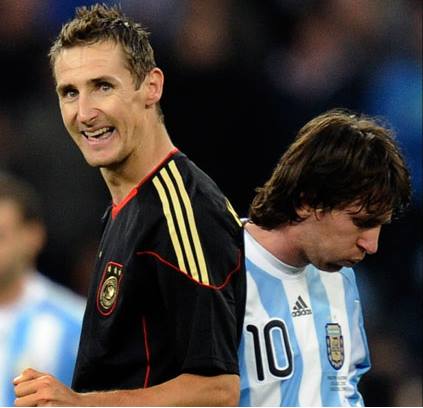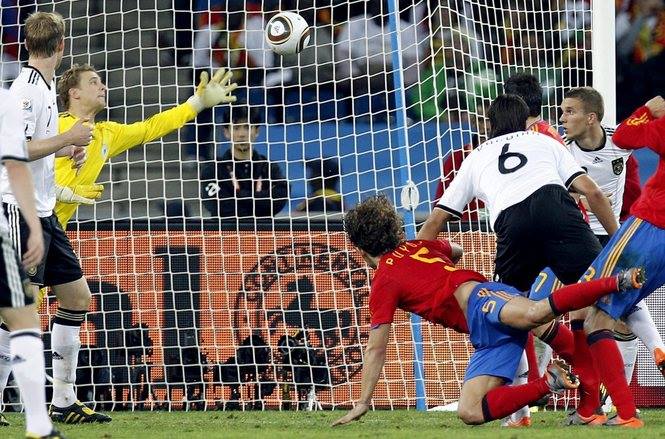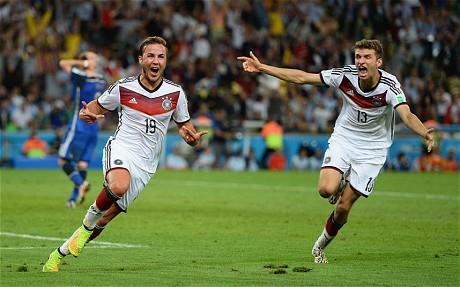The German Machine, after seven gruelling games of football has captured the most prized asset of all, the FIFA World Cup 2014. But, let’s look at it from a deeper perspective; I would credit their win to a change of mentality and not a change in skill. From being the most perfect team out there in terms of class, to showing an unquenchable thirst for success, they have moved onto winning by any means necessary. This mentality in the world of football is known as “winning ugly”, and the Germans have finally learnt to do so.
Our generation has witnessed numerous football clubs and national teams celebrating their centenary year and, in case of the England National Football Team, 150 years. For Germany, many of you may remember the catastrophe of Euro 2004; the ill-fated spectacle, which led to widespread changes in German football at every level in hierarchy, and resulted in them being crowned champions of the world. The question is: Why did it take so long? A decade might seem like a short time span in terms of success, but in the German lifeline, it was as long as a lifetime. Evidence proves that they were brilliant even a couple of years later in WC 2006, yet ultimately lost on home soil to Italy.

Comparing Germany’s class of 2014 to their 2010 teams, the difference in quality is quite easily recognizable. The 2010 team had better chemistry, was less error-prone, and acted as a well-oiled machine; the likes of which has not been seen since the Hungarian Magyars of 1950’s or the Brazilian side of 1970’s. The 2014 team looked really good too, but not even close to standards of their past decade’s players. Key injuries to left back Marcel Schmelzer, midfielder genius Ilkay Gundogan and Marco Reus, winner of “German Player of the Year” 2014, had wearied their team thin. The problem was the lack of talent in every department, except central attacking midfielder,and injured players not making the squad (For instance Sami Khedira). Furthermore, their dependency on a 36-year-old striker, although one of their greatest,MiroslavKlose, showed their lack of squad depth.
On the other hand, teams like Spain had such a large quantity of first-rate players, for example Isco, Ander Herrera, Jesus Navas, Negredo etcetera who were not selected for the World Cup due to squad size restrictions. And let’s not overlook the Brazilians such as Lucas Moura, Lucas Leiva, Ronaldinho and La Liga winners Miranda and Felipe Luis, who did not get to be part of their home World Cup. Yet, Germany with their injury ravaged, off-form players ended up winning the trophy. How did they beat such well off teams with their average squad?

The main reason why such a weakened squad thrived, but their class of 2006 and 2010 did not, is because they were prepared to win ugly if they had to. The preceding teams had the mentality to win every match by out_classing their opponents in every department. The 2010 team dispatched of England and Argentina by scoring 4 goals against each. The 2006 team stole the show with their vibrant play-making by a 22 year-old Bastian Schweinsteiger, to the comeback of Michael Ballack in the world cup. The 2014 team, on the other hand, had players such as MesutOzil, who was off form, Khedira, who was unfit, Lahm, who had lost his pace (and the list goes on). Beating Algeria by a margin of one goal in 120 minutes just showed how far their quality has dropped. Defeating the French from a set-piece also further enhanced this image. The Spanish Armada of 2008-2012, which won 3 trophies, is unmatched in their success rate. IkerCasillas has kept the longest run without conceding a goal in that period, inclusive of friendly and qualifying matches, while their winning and unbeaten streak has broken the previous records. Their match against Germany in the 2010 edition’s semifinal just showed how Germany’s perseverance over perfection won them the game. Germany dominated Spain in the tie in every sector, and also played more pulsating football, but Spain won through a headed goal from a corner by CarlesPuyol. They did not mean to thrash Germany, but just walk away with the win under their belt. It is similar to the France versus Germany game of this year’s edition, where Germany just won, regardless of their winning style.

Even though this winning team beat both Portugal and Brazil, it was only due to incompetence from their opponents. Horrendous errors from the defense of their challengers in both games gifted them large-margin wins. Recalling their games against the United States and Algeria, there were many instances the holes in their team were exploited. If it was not for some sweeper-keeper action from Manuel Neuer or the last ditched tackling from Philip Lahm, we may have seen an entirely different winner being crowned. Germany won ugly at the end of the day, learned from their past blunders and was ultimately rewarded for their resolve.










